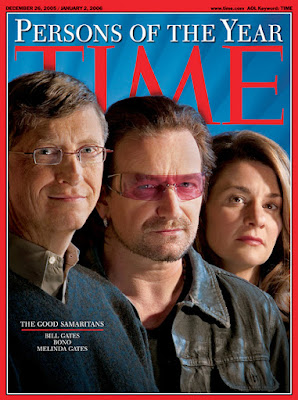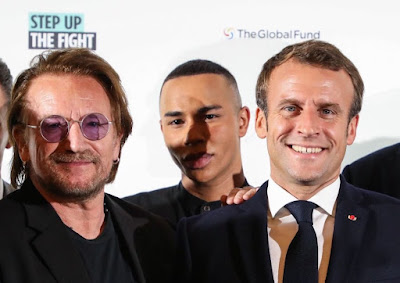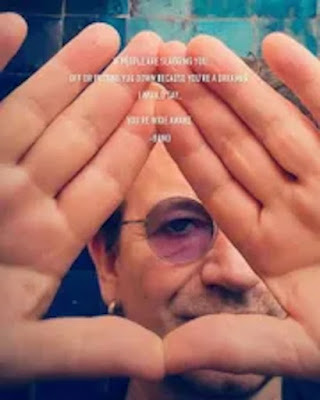The so-called “Paradise Papers,” which belonged to an offshore tax haven, showed that Bono had formed a company with two Irish businessmen based in the low-tax island of Malta and bought part of a shopping mall in Lithuania, thus eluding the international taxmen.In 2011, Bono, 57, who, according to CNN has an estimated net worth of $590 million, further angered his countrymen when he espoused the values of Ireland’s 12.5 percent corporate tax breaks. He went on the record to claim that these breaks for multi-billion dollar companies had brought Ireland the “only prosperity we’ve ever known.” He had a point, but as the locals noted, Bono wasn’t even giving the country a meager 12.5 percent any longer.Over the years, it has often been shown that what Bono says and what he does are two different things. In 2007, U2 moved part of its multi-million dollar song catalogue from Ireland to Amsterdam just as their homeland ended a tax exemption on music royalties, to take advantage of the Netherlands’ low to non-existent tax rates for musicians.
Fine — except in the ensuing years Bono (and his charity One) earned kudos for insisting countries, corporations and people pay taxes in pursuit of a fairer society.
To figure out how we got here and why a man as terminally cringe as Bono is a superstar, let's look at the accidents of history that got us to this miserable point to begin with. From The Secret History of Rock 'n Roll:
The biggest beneficiary of The Police’s breakup were U2. The Dublin band were the pet project of Island Records head Chris Blackwell, who needed to patch the giant hole in his wallet left by Bob Marley’s passing. U2’s early singles are total amateur-hour trash by any objective standard, but Blackwell rightly thought they had superstar potential.
U2 were slow-starters for Blackwell, so much so that his board wanted him to drop the band after (their second LP) October tanked. He didn’t, and instead sank a ton of money in selling the band’s third album War, which was essentially just “Sunday Bloody Sunday” and “New Year’s Day” and a shit-ton of filler of varying degrees of quality... but you can sell even the shittiest album if you have two strong singles, and War went gold.
Other labels were grooming bands such as INXS and The Fixx to fill that “safe and acceptable modern rock band” niche The Police had created and abandoned, but Blackwell continued to believe in U2, even after War’s underperformance...
Unfortunately, U2 repaid Blackwell’s undying faith with The Unforgettable Fire, which was every bit as filler-ridden as War but lacked a single with “Sunday’s” power.
Still, everyone wanted a dose of that Synchronicity sunshine, so Island pushed “Pride (in the Name of Love)” with great gusto and gumption and squeaked it into the Top 40. Heavy airplay on rock radio eventually pushed the LP to platinum status the following year.
But just what an inferior replacement Bono was for Sting was made painfully clear in 1986 when The Police reformed for an Amnesty International benefit at Giants Stadium.
Bono — looking like the biggest fucking dork ever to walk the earth — wandered confusedly onstage to duet with Sting on “Invisible Sun,” I guess on account of Bono was the self-appointed King of Ireland and the song’s theme required his blessing.
Unfortunately, Bono just came across like the pasty kid picked last in gym class next to Sting’s lithesome alpha-ness. He was dressed like he was going to a Fields of the Nephilim LARP and flubbed the lyrics to the song, croaking a melange of random couplets Sting already delivered instead of the actual verses.
A sneak preview of Bono cringe-monsoons to come, surely.
STORIES FOR BOYS (LOVERS)
The model boy on the cover is Peter Rowen, the younger brother of Guggi, Bono's friend and a former member of the Virgin Prunes. Peter also appeared on the covers of Three, War, The Best of 1980–1990, the unreleased Even Better than the Early Stuff, Early Demos and many singles. The photographer, Hugo McGuiness, and the sleeve designer, Steve Averill (a friend of Clayton), went on to work on several more U2 album covers.
For the American release and other international distributors, the album's cover image was changed, due to Island Records' fears that it could be perceived as pedophilic.
In hindsight, it seems crystal clear that this was -- at the very least-- U2's handlers signaling to the provable (and often convicted) child molesters who were running the music industry that U2 were down with the program. At least it does to me.
Worse, the lyrics to "Twilight" are hard to read as anything but an, uh, inter-generational sexual encounter.
And the fact that Bono was drinking buddies with the loathesome child molester Allen Ginsberg doesn't help.
From Wikipedia:
Ginsberg was a supporter and member of the North American M**n/B** L*** Association (N**BLA), a ped****lia and ped***sty advocacy organization in the United States that works to abolish age of consent laws and legalize sexual relations between adults and children.
In 1994, Ginsberg appeared in a documentary on N**BLA called Chicken H**k: Men Who Love B**s (playing on the gay male slang term "Ch***enhawk"), in which he read a "graphic ode to youth." In her 2002 book Heartbreak, Andrea Dworkin claimed Ginsberg had ulterior motives for allying with N**BLA:
[I]n 1982, newspapers reported in huge headlines that the Supreme Court had ruled ch**d p**nogra*hy illegal. I was thrilled. I knew Allen would not be. I did think he was a civil libertarian. But, in fact, he was a pedophile. He did not belong to the North American M**/B** L*** Association out of some mad, abstract conviction that its voice had to be heard. He meant it."
And then there's Songs of Innocence, the craptastic stinker that Apple forcibly downloaded into literally everyone's iTunes, whether they wanted it or not ...
... that's just fucking gross.
U2's little pin-up star was the brother of one of Bono's lifelong best friends, which is just inexplicably weird. At least it is until you find out who that friend is and what band he was in:
Lypton Village was a "youthful gang" created by Guggi (né Derek Rowen), Friday (né Fionan Hanvey), and Bono (né Paul Hewson) in the early 1970s. Resultantly, Virgin Prunes thus consisted of childhood friends of U2's Bono. Known for their outrageous and controversial stage performances, led by theatrical singer/songwriter Friday, the band began playing small shows in Dublin, gaining them a cult audience.
Continuing:
Sharing stages throughout Dublin and environs throughout the end of the 70’s, both groups experienced mixed reactions, with audiences becoming particularly polarised by the Prunes, one early review noting:“Prunes music now passes far beyond their first antic thrashabouts. There are moments when it sounds like a hybrid between the Pink Floyd and The Gang of Four but really that’s just an indicator to emphasize it possesses greater warmth and colour than the usual modern staccato manifestos. Their music won’t allow them membership of The Cold War….The Prunes motifs are ancient, perhaps Egyptian or obscure Asian or even Teen Masonic”
Another excuse that they’re still so unknown and underground after so many years have passed is that their work is simply not for everyone. Motherfuckers are evil sounding. If you don’t like an evil-sounding racket, get back to your Carpenter’s albums—quick—and just keep moving. These guys might damage you for life.
If Satan himself had a band, they would try to sound like the Virgin Prunes.
Mind you, I'm generally inclined to give Goth bands a lot of leeway when it comes to theatrical villainy, but I've noticed something a bit unsettling about the Virgin Prunes. And that's all the lyrics that seem to be about raping and murdering children.
Like this:
And this:
Pretty little girl
Pretty little girls in the bathroom
Sitting on the carpet
Always the devil in me
He makes me feel like a man
I’m looking for something beautiful
I’m looking for a sign
Pretty little girl
Comes up to me to say
Jump up onto my back and I’ll carry you away
Violent and tragic
True life story
This one seems to be about a grown woman, which really doesn't come off much better:
Don’t look at me
But please stay with me
He didn’t wear his scarlet robe,
for blood and wine are red
And blood and wine were on his hands,
when they found him with the dead
The poor dead woman,
whom he loved and murdered in her bed
Then there's the charmingly-titled "Beast (Seven Bastard Suck)"
SPEAKING OF BEASTS
Not so fast, Skippy.
Now, I'm sure a lot of people would argue that this could be a reference to Jesus, but there's nothing in the lyrics to support that.
Bono has aggressively promoted the movies of the occultist Kenneth Anger. When Bono was considering establishing ZooTV to rival MTV, he envisioned it “as a window for the world to see the films of Kenneth Anger” (Bill Flanagan, U2: At the End of the World, 1996, p. 477).
Bono told Details magazine, “Part of America’s dilemma is its TV because as a mirror it’s a pretty distorted one. I mean, where can you see Kenneth Anger films in the United States?”
"Love is the Temple, Love the Higher Law."
- Bono, "One"
"Love is the Law, Love Under Will.'
- Aleister Crowley, Liber AL Legis
Not only is the title of this song identical to the science fiction novel by Robert Heinlein, but some of the lyrics reference the book.
"We asked him to smile for a photograph
Waited a while to see if we could make him laugh"
This is a direct reference to the lead character, Valentine Michael Smith, a human born and raised among extraterrestrials. When Smith arrives to Earth for the first time, he doesn’t understand the concept of laughter.
...Heinlein’s following shows up in unexpected places: He’s the hero of numerous astronauts, Silicon Valley types and those seeking to privatize space travel. He isn’t just their favorite writer; he set them on their life’s course.
He generated public enthusiasm for the space race, inspired the genre called “military science fiction.” Tom Clancy, Microsoft co-founder Paul Allen and countless libertarians are fans. A crater on Mars is named for him.
As we’ve shown, the character of Valentine Michael Smith follows Crowley’s archetypal retelling of the Dionysus/Bacchus myth which later evolved into the Jesus motif. He also fulfills all but one of the prophecies of Liber Legis as the Thelemic messiah who follows, and is heir to, Crowley. (It is interesting to note that Parsons was once widely considered to be Crowley’s heir and, as mentioned above, his Babalon Working was designed to invoke yet another heir.)
And here we see Harpocrates, Crowley's Crowned and Conquering Child yet again:
The sole Liber Legis prophecy that Michael doesn’t answer is that he fails to crack the code in Liber Legis. What he does do is to open the New Aeon, the Age of the Magickal Child, by the revealing of the Martian language, which may be isomorphic.
And the coup de gras:
We’re awfully close to understanding Heinlein’s motives now. We’ve proven the link of Thelema and Stranger, and the link between Heinlein and Thelema. The text of Stranger meets the criteria for allegory and is loaded with puzzles which clearly reference magickal and Thelemic themes.
Historically, Heinlein was never a member of the OTO, although he certainly may have seen the Gnostic Mass as it was open to the public. Yet his description of the people and events in the nest are oddly reminiscent of life in secret Thelemic communities.































